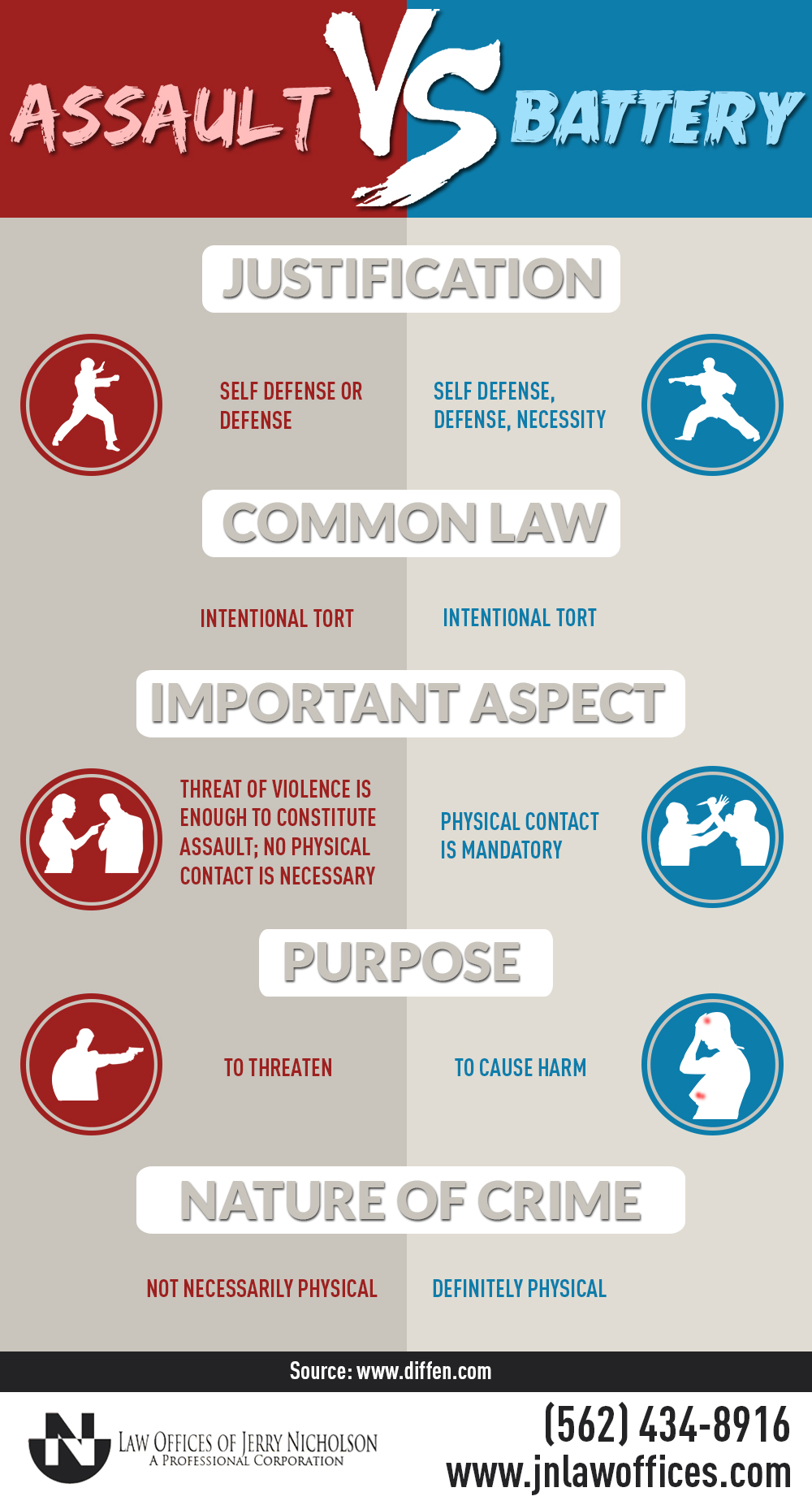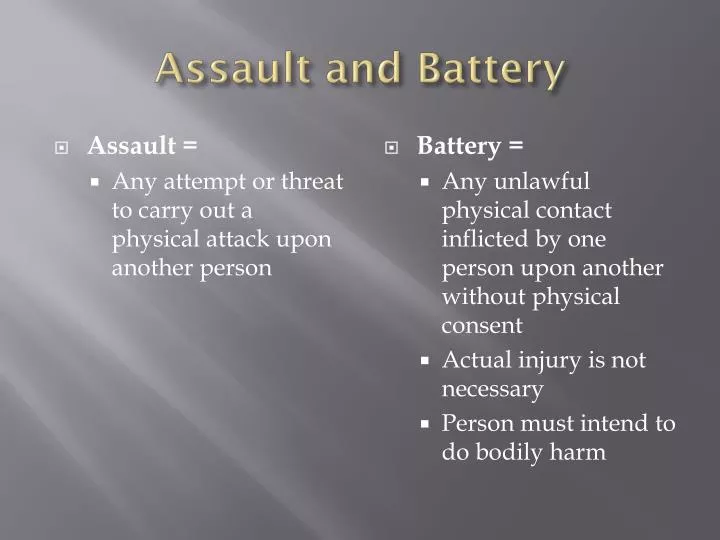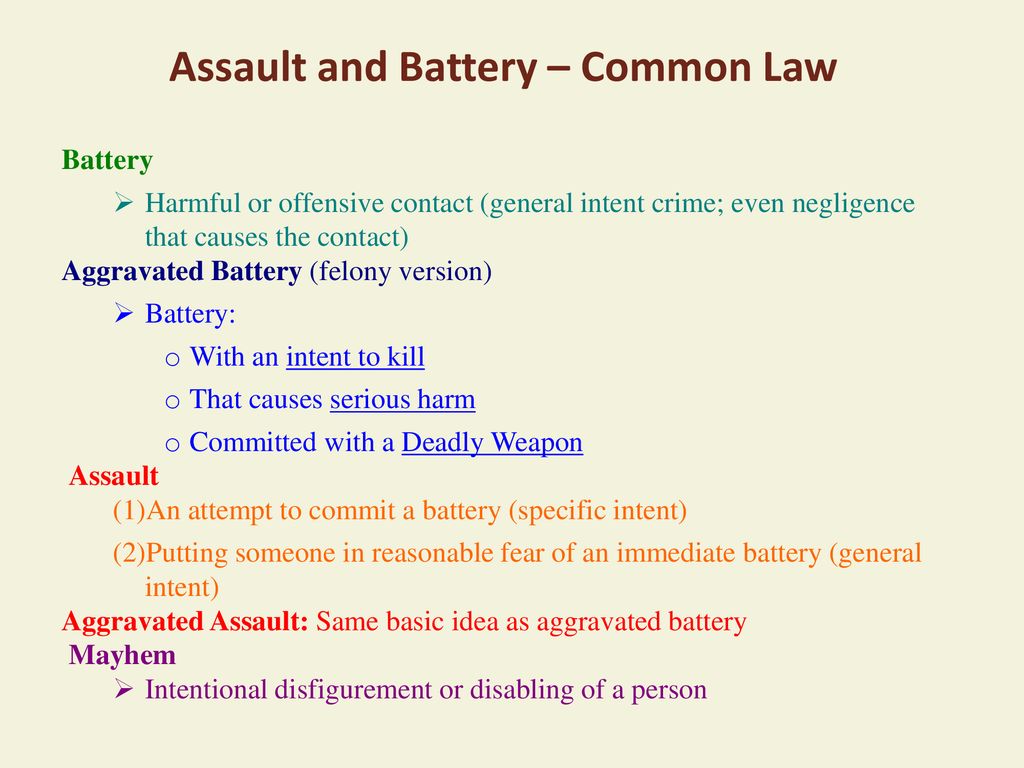Battery Arrest Definition - Battery is an unlawful application of force directly or indirectly upon another person or their personal belongings, causing bodily injury or offensive. Assault typically involves the threat or attempt. Battery is often closely associated with the crime of assault, but the two are distinct. Explore the legal definition of battery, its elements, jurisdictional differences, and the distinctions between civil and criminal cases.
Battery is often closely associated with the crime of assault, but the two are distinct. Assault typically involves the threat or attempt. Explore the legal definition of battery, its elements, jurisdictional differences, and the distinctions between civil and criminal cases. Battery is an unlawful application of force directly or indirectly upon another person or their personal belongings, causing bodily injury or offensive.
Battery is often closely associated with the crime of assault, but the two are distinct. Assault typically involves the threat or attempt. Explore the legal definition of battery, its elements, jurisdictional differences, and the distinctions between civil and criminal cases. Battery is an unlawful application of force directly or indirectly upon another person or their personal belongings, causing bodily injury or offensive.
What Is the Difference Between Assault and Battery?
Assault typically involves the threat or attempt. Battery is often closely associated with the crime of assault, but the two are distinct. Battery is an unlawful application of force directly or indirectly upon another person or their personal belongings, causing bodily injury or offensive. Explore the legal definition of battery, its elements, jurisdictional differences, and the distinctions between civil and.
Battery Definition For Class 6 at Katherine Roosa blog
Battery is an unlawful application of force directly or indirectly upon another person or their personal belongings, causing bodily injury or offensive. Assault typically involves the threat or attempt. Battery is often closely associated with the crime of assault, but the two are distinct. Explore the legal definition of battery, its elements, jurisdictional differences, and the distinctions between civil and.
Infographic Assault VS. Battery
Battery is often closely associated with the crime of assault, but the two are distinct. Battery is an unlawful application of force directly or indirectly upon another person or their personal belongings, causing bodily injury or offensive. Explore the legal definition of battery, its elements, jurisdictional differences, and the distinctions between civil and criminal cases. Assault typically involves the threat.
A comprehensive understanding of the battery monitoring system
Assault typically involves the threat or attempt. Explore the legal definition of battery, its elements, jurisdictional differences, and the distinctions between civil and criminal cases. Battery is an unlawful application of force directly or indirectly upon another person or their personal belongings, causing bodily injury or offensive. Battery is often closely associated with the crime of assault, but the two.
PPT Assault and Battery PowerPoint Presentation, free download ID
Assault typically involves the threat or attempt. Battery is an unlawful application of force directly or indirectly upon another person or their personal belongings, causing bodily injury or offensive. Explore the legal definition of battery, its elements, jurisdictional differences, and the distinctions between civil and criminal cases. Battery is often closely associated with the crime of assault, but the two.
Deciphering the Difference Between Assault and Battery
Assault typically involves the threat or attempt. Battery is an unlawful application of force directly or indirectly upon another person or their personal belongings, causing bodily injury or offensive. Battery is often closely associated with the crime of assault, but the two are distinct. Explore the legal definition of battery, its elements, jurisdictional differences, and the distinctions between civil and.
What’s the Difference Between Battery and Domestic Battery? Domestic
Explore the legal definition of battery, its elements, jurisdictional differences, and the distinctions between civil and criminal cases. Battery is an unlawful application of force directly or indirectly upon another person or their personal belongings, causing bodily injury or offensive. Battery is often closely associated with the crime of assault, but the two are distinct. Assault typically involves the threat.
Main Difference Between Assault And Battery Baysection
Explore the legal definition of battery, its elements, jurisdictional differences, and the distinctions between civil and criminal cases. Battery is an unlawful application of force directly or indirectly upon another person or their personal belongings, causing bodily injury or offensive. Battery is often closely associated with the crime of assault, but the two are distinct. Assault typically involves the threat.
Battery Definition, Types, Examples And Cases
Assault typically involves the threat or attempt. Battery is an unlawful application of force directly or indirectly upon another person or their personal belongings, causing bodily injury or offensive. Explore the legal definition of battery, its elements, jurisdictional differences, and the distinctions between civil and criminal cases. Battery is often closely associated with the crime of assault, but the two.
Assault and Battery Common Law ppt download
Explore the legal definition of battery, its elements, jurisdictional differences, and the distinctions between civil and criminal cases. Battery is an unlawful application of force directly or indirectly upon another person or their personal belongings, causing bodily injury or offensive. Battery is often closely associated with the crime of assault, but the two are distinct. Assault typically involves the threat.
Battery Is Often Closely Associated With The Crime Of Assault, But The Two Are Distinct.
Assault typically involves the threat or attempt. Explore the legal definition of battery, its elements, jurisdictional differences, and the distinctions between civil and criminal cases. Battery is an unlawful application of force directly or indirectly upon another person or their personal belongings, causing bodily injury or offensive.









